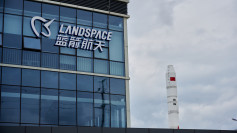Since its official launch on September 12th, orders for Wenjie's new M7 model have been steadily rising. Less than 24 hours after its release, the order count surpassed 15,000. By September 16th and 17th, Wenjie reported daily orders of 2,000 and 2,700 units respectively, pushing the total orders for the new M7 model past 20,000.
Offline, the release of Huawei's Mate 60 smartphone and Wenjie's new M7 model has significantly boosted foot traffic in Huawei stores, especially over the weekend.
A Wenjie sales representative from a Huawei store in Shanghai told Business Times that recent in-store visits have nearly tripled. Official data indicates that daily orders for the new M7 model in the Shanghai region broke 100 units for two consecutive days. Sales representatives from various stores reported weekend orders reaching double digits.
Another Wenjie salesperson shared that the weekend was exceptionally busy, with customers having to wait in line for test drives. The Huawei Mate 60 display section was even more crowded, with visitors packed several layers deep.
The salesperson recalled that from 9 a.m. to 9:30 p.m. on Sunday, customers were continuously lining up for test drives. Some, unable to wait, left the store. Over 40 groups test drove the vehicle that day.
Currently, the showroom displays the older M7 model, while the test drive vehicle is the new model. Each store gets a turn with the test drive vehicle, meaning those wanting a test drive this week will have to wait until the weekend.
The new M7 model is priced between 249,800 and 329,800 yuan, a 70,000 yuan drop from the original M7 model and 40,000 yuan cheaper than the older model's price earlier this year. In addition to the current official discount of 43,000 yuan, Wenjie sales staff mentioned that those who order the M7 now can get priority delivery for the Mate 60 series.
Since the launch of the new M7, Wenjie sales have been busier than at any other time this year. In 2023, Wenjie's sales performance has been lackluster, with monthly sales hovering between 3,000 and 5,000 units. Compared to last year's annual sales of 75,000 units, the continued popularity of the M7 might lead to a sales rebound.
Notably, within Huawei's sales channels, the smartphone's effect on driving traffic to the cars is evident once again.
Sales representatives shared that customers either come directly to see the M7 or visit after checking out the Mate 60. However, many customers might have shifted their attention from the popular Mate 60 to the Wenjie M7, leading them to visit the store for a test drive.
Historically, Huawei has utilized its existing smartphone retail channels to sell cars, a strategy different from traditional car dealership models and direct-sales models of new automotive forces. In less than two years, Wenjie has established over a thousand sales points, a height other car brands find hard to match.
Recently, Huawei began unifying and adjusting its sales channels. Multiple Huawei stores informed Business Times that existing authorized dealer stores will gradually transition to a quasi-direct sales model, with sales staff provided by Huawei. Existing sales staff contracts will also be transferred to Huawei. The manager of a Huawei Smart Life store in Shanghai mentioned that their store would transition to the quasi-direct sales model in October.
In addition to reforming its retail channels, Huawei has also adjusted its user center management. Two AITO user centers in Shanghai, led by car dealers, were refurbished in June according to Huawei standards, with additional Huawei management staff stationed to standardize the sales process. It's understood that subsequent car models launched in collaboration with other brands will be sold in the aforementioned quasi-direct sales stores, while the fate of the user centers remains uncertain.




